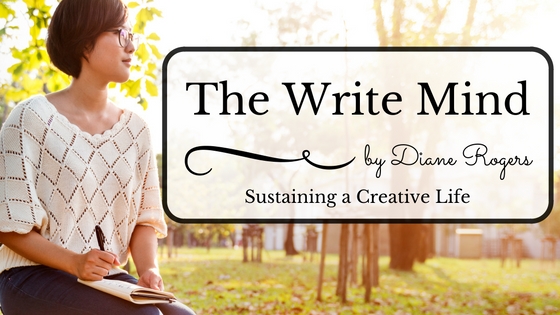by Diane Rogers
Creative Passion: An Advantage for Writers
Adults spend more hours working than on any other single activity, so it probably won’t surprise you to learn that your occupation has a significant impact on your health and well-being. Interestingly, however, less than half of workers are actually happy at work. According to the Wall Street Journal, although work satisfaction in the United States is at its highest level in 10 years, only one in two workers feel fulfilled. Global statistics indicate Americans aren’t alone either. The bulk of the world’s workers feel unhappy in their workplace.
As far as I’m concerned, that’s just way too much misery.
If your personal happiness depends on having a positive relationship with your occupation, it becomes a mental and physical health imperative to like what you do.
In this regard, writers and artists may have an advantage over others. Poets, writers, and artists are in love with what they do. The work of making art, the craft of bringing words to life flows from a place of passion. Inspired and energized, the writer transforms thoughts and emotions into stories and poems that will, in turn, engage and uplift readers.
If you’re a part time writer actively working a “day job” you don’t love, take heart. Your creative projects and outside of work passions will keep you buoyant, positive, and healthy.
I recently came across a quote by poet and essayist Jane Hirshfield, who refers to her passion for writing as an “enlarging” force. Hirshfield says “In the wholeheartedness of concentration, world and self begin to cohere. With that state comes an enlarging: of what may be known, what may be felt, and what may be done.”
The Positive Impacts of Creative Passion
Passion is a kind of sustainable energy that stems from the personal authenticity of being aligned and engaged with what you do. Think of it as oxygen to the spirit and a buzz for the brain.
In recent years, brain science discoveries suggest that feelings of love and passion stimulate 12 distinct areas of the brain (Ortigue et al., 2010). Psychologist and author Jeremy Dean says passionate feelings cause the brain to release a cocktail of feel-good chemicals equivalent to a “small dose of cocaine” into the blood stream. It also serves to suppress activity in areas of the brain where grieving, fear, and anxiety occur. Passion fills our veins with dopamine, oxytocin, vasopressin, and adrenaline, so it’s a bit like being on a high.
Creative Passion Increases Confidence
When the brain detects love or passion, its reward center reacts by sending a potent cocktail of neuro-chemical happiness messages racing through the body. If you’ve ever been in love (and who hasn’t), you know the impact of “love chemicals” and “happy hormones” in your body—they blast you with confidence and blind you to obstacles. Without maturity, unbridled passion has the ability to highjack brains and bodies with an unstoppable force that drives people (young and old) indiscriminately toward the object of their desire with the conviction to succeed.
But that’s not necessarily a bad thing.
When it comes to writing, author and financial journalist, Michael Lewis thinks blind love can be beneficial. Lewis says, “When you’re trying to create a career as a writer, a little delusional thinking goes a long way.”
Best-selling author Elizabeth Gilbert agrees. She describes her own compulsion for writing as “magical thinking.” Gilbert calls her passion for her work “a relationship, a collaboration, between me and the mystery.” Underpinning her drive is the belief that “the work wants to be made as much as I want to make it,” Gilbert says. “As long as I hold on to that belief, it will come into being.”
Passion Inspires Persistence
Every aspiring writer and authorpreneur inevitably encounters self-doubt, criticism, a personal setback (or 12), and other seemingly insurmountable obstacles. The pathway to making one’s dreams come true is paved with untold hours of labor, the occasional tear, and the tenacity to stay the course. Persistence is having the commitment to persevere despite disappointments and inconsistencies.
Novelist Isabel Allende advises, “Show up, show up, show up, and after a while the muse shows up, too.” The essential foundation of the “stick-to-it” attitude is personal will sparked by genuine passion. Together these forces have the power to unite the mind, heart, and soul and ignite genius.
Of persistence, Pulitzer Prize winning novelist, Annie Dillard says, “At its best, the sensation of writing is that of any unmerited grace … You search, you break your heart, your back, your brain, and then—and only then—is it handed to you.”
Passion Reduces Stress
We all have experiences of doing something we really don’t want to do. It’s the feeling of forcing yourself into a shoebox. The fit will never be right. Taking on a project without being passionate about it can your sap energy and erode your confidence. Work without passion is often laced with friction. When faced with work that’s “not really you,” things don’t flow easily. Sure, you might be able to accomplish the work, but going against the grain causes unnecessary stress and anxiety, and ultimately takes a toll on your immune system.
On the other hand, using your natural gifts and talents opens the door to a more natural flow because a brain at ease sends happy chemicals and hormones into your bloodstream. Feeling relaxed and energized fills you with a sense of purpose and possibility. Working in alignment with your true nature across all aspects of life—work, love, and play—can remove significant sources of stress and the negative knock on effects of living a life you were never meant to live.
Happiness has a positive impact on how we approach and experience everything in life.
Putting Creative Passion to Work
But passion isn’t a cure all. It can’t magically remove life’s ills or manifest that seven figure book deal. Passion alone is not a predictor of success or great relationships. The creative life offers a unique path with challenges of its own.
All writers know writing is hard, often grueling work with more than its share of frustrations and wrong turns. For a writer, there’s no such thing as “not being in the mood” to work. Writing is a discipline that requires passion plus the willingness to show up and endure sub-prime conditions such as early mornings, late nights, and cold coffee.
Whether you’re an aspiring or an accomplished writer, practice feeds your passion. Pulitzer Prize winner author Jennifer Egan suggests, “You can only write regularly if you’re willing to write badly… Accept bad writing as a way of priming the pump, a warm-up exercise that allows you to write well.”
Journalist and author Susan Orlean puts it this way: “You have to simply love writing, and you have to remind yourself often that you love it.”
As a writer, you have the ability to lose yourself in what you love. Savor your creative passion and watch how your happiness advantage makes a positive impact on every aspect of your life and the lives of others.
How does your creative passion make a positive difference in the lives of others?
***

Dr. Diane Rogers, Author
After retiring from a corporate career in business transformation and change management, Dr. Diane Rogers brings her expertise in social psychology to classrooms and families.
Her first picture book, Stand Tall, made its debut at the 2008 Seeds of Compassion Conference in Seattle, Washington featuring His Holiness the 14th Dalai Lama. A week after the book’s release, the State of Washington selected Stand Tall as an official teaching resource for compassionate education. Diane’s other published works include Emerge, A Story of Confidence, and When We All Stand Tall. To find out more, visit www.drdianerogers.com.
A self-professed global nomad, when they aren’t traveling on or jumping out of planes, Diane and her husband Kevin triangulate between Sydney, Australia, Newport Beach, and their sailboat in the Mediterranean.
**O.C. Writers is a member of Amazon Associates. By clicking any of the book links on this site, the network earns a small commission from your purchase..




